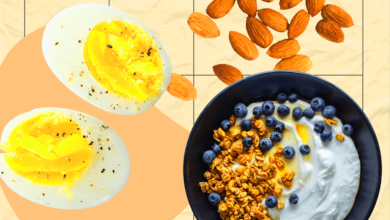25 Tips for Weight Loss

Over the years, you’ve probably heard your fair share of wacky weight loss advice, whether it’s to drink celery juice every day or replace your meals with weight loss “cookies.” Often, those tips are promoted by people without any health expertise, so if something sounds too good to be true, it probably is.
But just as there’s a ton of misguided weight loss advice out there to be avoided, there are also a lot of legitimate, research-backed, and expert-approved suggestions for people who are in the right mental health space and have weight loss as a personal goal.
One such tip is to improve the quality of your diet. Researchers looked at data from more than 15,000 people and found that those who ate the least processed foods had a lower risk of obesity, while those who ate the most had an elevated risk. The merits of plant-based diets have been particularly well-researched. In one study of more than 200 dieters, those who adopted a low-fat plant-based diet for 16 weeks lost significantly more weight compared with a control group.
There are also multiple studies suggesting having strong social support in your weight loss effort can help, whether that comes from family and friends, a coach, or even an app or online community. Participating in an online support group can help increase motivation, according to research published in July 2022 in Digital Health.
Here are some more expert-approved and science-backed tips that can help you achieve and maintain a healthy weight.
Tips for Weight Loss:
1. Eat Slowly
“I have my clients learn how to choose foods they like, really taste each morsel going into their mouths, and chew deliberately. I advise them to chew slowly, swallow only when the food is all chewed up, and repeat. It takes time to know we’re full. Eating slowly not only allows us to enjoy our food more but gives us better cues of satiety and weight loss.”
2. Enjoy the Food You Eat
“So often we’re told what to eat, and then when we don’t like that specific food, we’re less apt to create long-term healthy habits. Try new fruits and vegetables. Find out how to prepare new dishes that provide variety and flavor. Add herbs and spices to elevate the flavor. Or if you prefer, savor the sweetness of fruit and the depth of raw and steamed vegetables. There’s no reason that your relationship with food can’t be pleasurable.”
3. Keep a Daily Gratitude Journal
“Our eating habits are sometimes connected to our emotions, whether we realize it or not. When we’re stressed, we may use food to help cope with the stress. I work with clients on keeping a daily journal of things they’re grateful for — or even just a journal to write in when stressed — so that they’re better prepared to cope with the stress by acknowledging it and utilizing other tools, rather than reaching for food as a coping mechanism.”
4. Batch Cook and Prep
“Every Sunday I batch cook enough chicken for the week. I cut off the fat, bake it with seasoning, measure 3.5 ounces, and put that much into a container with some mustard and frozen veggies, so I can grab one a day to bring to work.
I also take the time to divvy up in individual containers ¼ cup of rolled oats for weight, 1 tablespoon each of natural peanut butter and ground flax, and a pinch each of protein powder and cinnamon to sweeten. So when I’m a zombie in the morning, all I need to do is add water and microwave!”
5. Don’t Forget the Weights
“Make sure you are lifting weights two or three times a week. Using moderate to heavy weights — three or four sets of 10 to 15 reps with weights that challenge you — helps increase your muscle mass. When you have more muscle on your body, the food you eat is more likely to be utilized as fuel, rather than be stored as fat.”
6. Get Enough Z’s
“A lack of sleep increases your hunger hormone, ghrelin, and decreases your satisfaction hormone, leptin, which can contribute to weight gain. When we are sleep-deprived, we crave more salty and sweet foods. Why? Anytime you feel more intense hunger, your cravings for higher energy — aka higher calorie — foods intensify. We also know that the way we think and process our emotions is affected by inadequate sleep, so it’s easy to connect this with an impaired ability to make reasonable choices in many areas of life, including food.
If we flip the coin, we can safely assume that when we are well-rested, our bodies work better. When it comes to eating, that would mean that we would eat when we are truly hungry and eat just until satisfied. Our hormones are also going to be better balanced because our bodies got the time needed to sleep, repair, and refresh.”
7. Don’t Skip Meals
“Remember, our body’s ultimate goal is to stay alive. As soon as we are being kept from calories, which are the life energy for our bodies, they will do things to survive. Our body knows what foods are higher in energy density, and we will crave those more. Honor your hunger and don’t allow your body to think it’s being starved. This goes against many of the dieting tactics, but those tactics truly don’t work well for people in the long term. I generally recommend eating every four hours.”
8. Stay Hydrated
“Research has found that people who drank two glasses of water before a meal lost more weight than people who didn’t drink water before meals — and they kept it off. This simple tip works in two ways. Thirst can mask itself as hunger, causing you to eat more. And water makes you feel fuller, causing you to eat less during a meal.”
9. Cut Calories, Not Flavor
“By choosing options such as sharp cheddar over mild cheddar, you can use less, but you’ll still get a lot of flavor without feeling like you’re on a diet.”
10. Reorganize Your Plate
“Make half your plate vegetables, a quarter of your plate whole grains, and a quarter of your plate lean protein. When you switch the portions of grains and vegetables on your plate, you’ll see a difference. The only caveat: Potatoes, corn, and peas are starchy vegetables, so they go in the grains category.”
11. Start Where You Are and Do What You Can
“Don’t feel like you need to overhaul your entire life starting immediately. Assess where you are currently and then figure out where you’d like to be in the future. A great starting point for mostly sedentary people is to get a step counter and see how much you walk on a normal day. Then set a step goal slightly higher than the norm and strive for that, working your way up slowly to a goal of 10,000 steps per day.”
12. Think Big — Not Small
“Focus on the weight loss ‘big rocks’ — there are a few areas that will give you the most bang for your buck when you’re trying to lose weight. Prioritizing those and letting go of all the minutiae that contribute to overwhelm will make reaching your goals feel easier and more sustainable. On the nutrition front, pay attention to calories, protein, and fiber. For exercise, prioritize strength training, daily steps, and recovery.”
13. Look Beyond the Scale
“While the scale isn’t useless, it also isn’t the only thing that matters. To help you gauge progress that might not be reflected on the scale, take regular photos and measurements, in addition to keeping a running list of nonscale victories. This will help keep the scale in perspective and show you all the positive changes you’re making to your health and overall lifestyle.”

14. Give Your Breakfast a Protein Boost
“Aim for 15 to 25 grams of protein at breakfast. Protein is digested slowly and suppresses hunger hormones, helping keep you full. Additionally, a high-protein breakfast helps curb cravings later in the day. Pair protein foods with fiber and healthy fats, like two eggs with whole-wheat toast and avocado or high-protein frozen waffles with nuts, berries, and a little maple syrup.”
15. In Fact, Consume Protein at Every Meal
“Eating protein-rich foods at every meal, especially breakfast, can help shave extra pounds. Protein slows down the digestive process positively impacts your hunger hormones and helps weight loss. Protein can also do better at staving off hunger than carbohydrates. Protein-rich foods include quinoa, edamame, beans, seeds, nuts, eggs, yogurt, cheese, tofu, lentil pasta, poultry, fish, and meat.”
16. Try to Eat Mainly Whole, Minimally Processed Foods
“ The multiple processing steps and added ingredients are the reason processed foods taste so good and we keep wanting more. They tend to contain large amounts of added sugars, fats, and salt. Research suggests that people can take in up to 500 more calories a day when they’re offered unlimited amounts of ultra-processed foods compared to unprocessed foods.”
17. Limit High-Glycemic Carbohydrate Foods
“The glycemic index ranks how quickly blood sugar rises after eating a carbohydrate food. Eating high-glycemic carbohydrate foods like white potatoes and refined bread, especially when eaten alone, will cause a surge in blood sugar, followed by a quick drop.
This leaves you feeling hungry and wanting more food. More long-term studies are needed, but short-term studies provide evidence there is a connection. High-glycemic foods are not off-limits though. When you work with a registered dietitian-nutritionist, we provide individualized ways to help you balance nutrients to prevent spikes in blood sugar, which can help with curbing appetite.”
18. Experiment With Fruits at Dessert Time
“Fruits are low in calories and carry tons of nutrients like antioxidants and fiber. According to the Centers for Disease Control and Prevention, only about 10 percent of the U.S. population is meeting their fruit and vegetable intake.
Using fruits for dessert will help you meet your daily requirements and also add flavor to your day. Many fruits can be sauteed, grilled, or baked. For example, grilled peach topped with vanilla yogurt and shaved almonds is amazing!”
19. Eat Breakfast Like a King, Lunch Like a Prince, and Dinner Like a Pauper
“It’s a saying that has many meanings, but you’ll want to take in more of your calories earlier in the day. A study published in November 2019 in the journal Nutrients found that subjects who were given small breakfasts and large dinners lost significantly less weight than those assigned to a large breakfast and a smaller dinner. So here we see how smaller meals in the latter part of the day may be an advantage to those who want to lose weight and improve overall health. The interesting thing about this study was the time the dinner was eaten.
They found that eating the main meal (larger meal) too late (after 3 p.m.) was associated with difficulty in losing weight. It’s important to note that this study is not saying that everyone should not eat after 3 p.m. Each person has individual needs, which may require additional snacks and food, such as those who are pregnant, are breastfeeding, have diabetes, or take medication that requires certain foods. This is why it is so important that you seek a consultation with a registered dietitian nutritionist.”
20. Get Into Meal Planning
“Meal planning is one of my top tips for staying healthy and eating well. I’m such a fan of the concept that I wrote a book about it! Taking 5 to 10 minutes over the weekend to write out a menu for the week ahead will save you time, money, and unwanted calories down the road. Not sure what to make for dinner tonight?
No worries, it’s already on your menu plan. Menu planning is a great way to stay organized and know what groceries you need to buy and what you already have on hand, and it will help ensure a balanced plate. Keep in mind, a night off from cooking and ordering takeout or making a frozen meal is an acceptable part of the menu plan. The benefit is knowing ahead that you’ll be doing that so you’re not scrounging when hunger sets in. And be sure to write down the plan — you’re more likely to stick to it if it’s in front of you as a reminder.”
21. Make a Grocery List and Stick to It
“Once you have your menu planned for the week, make a shopping list either on paper or on your phone — I use Notes, but there are apps for this, too. Knowing in advance what you need to purchase at the supermarket will save you time, reduce food waste, and prevent you from purchasing items that look appealing but you don’t need. To stick with your list, avoid shopping when hungry or tired. Research shows an increase in impulsive behavior at those times.”
22. Take Stock of What’s in Your Kitchen
“To cook healthy meals you need the right ingredients and kitchen tools on hand. Some staple ingredients I recommend having in your pantry, fridge, and freezer are low-sodium canned beans, canned fish, tomato sauce, whole-grain pasta, quinoa, brown rice, low-sodium stock, low-fat plain yogurt, a variety of fresh and frozen fruit and vegetables, olive oil, and dried herbs and spices. These are just some of the ingredients that can form the base of a healthy and delicious meal.”
23. Have the Right Tools on Hand
“Similarly, having a good mix of kitchen tools can help ensure easy, efficient, and healthy cooking. For example, a seasoned cast-iron skillet is one of my favorite pans to cook eggs, saute vegetables, and make pancakes, since I don’t have to use as much oil or butter to keep food from sticking.
Some of my other favorite kitchen tools are an immersion blender, an Instant Pot, baking sheets, measuring cups and spoons, and a hand juicer. And of course, anyone working in the kitchen should have a quality set of knives.”

24. Read Food Labels
Getting into the habit of flipping your packages over can save you time, money, and even calories. Food labels give you a clear picture of what you’re getting and if you want to lose weight healthfully, it’s not just about how many calories you’re getting — it’s also about what kind of calories you’re getting. To make sure that your meals are valuable, be sure that you’re getting a balance of nutrients without overdoing sodium, sugar, and saturated fat.
25. Choose Super Snacks
It’s best to look at your snacks as mini-meals. We are snacking more than ever, so it’s best to choose snacks with benefits, like almond butter and a sliced apple or Greek yogurt topped with fruit and high-fiber cereal. It’s not easy to get everything you need in a day, so nutritionally rich snacks can help fill that gap while also making you feel more full and satisfied.
Also read: https://www.healthevoke.com/4-life-changing-benefits-of-drinking-more-water/












One Comment